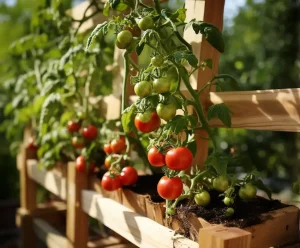Tomato plants are among the most popular and rewarding garden crops. However, as they grow, they can become heavy and unruly, leading to a myriad of issues that can affect their health and productivity. This article explores why tomato cages are essential, offering a step-by-step guide to selecting and setting up the perfect support for your tomato plants.

The Importance of Tomato Cages
Support for Growth: Tomato plants, especially indeterminate varieties, can grow quite tall and are prone to tipping over under the weight of their fruit.
Air Circulation: Properly supported plants have better air circulation around the foliage, reducing the risk of diseases like blight and fungal infections.
Sunlight Exposure: Cages ensure that plants receive even sunlight, which is crucial for fruit development.
Cleanliness: Keeping tomatoes off the ground protects them from soil-borne pests and diseases, and keeps the fruit clean.
Ease of Harvest: Staked and caged tomatoes are easier to harvest than those sprawling on the ground.
Step 1: Choosing the Right Cage
Size Matters: Choose a cage that can accommodate the full-grown size of your tomato plants. Indeterminate varieties may need taller and sturdier cages.
Material: Cages are available in various materials, including wire, metal, and wood. Consider durability, weather resistance, and ease of storage.
Design: Some cages are conical, while others are square or round. The design can impact the ease of access to the plant and overall stability.
Step 2: Timing is Key
Early Installation: Install cages early in the season, shortly after transplanting tomato seedlings. This minimizes root disturbance and ensures that the plant grows up within the support structure.









